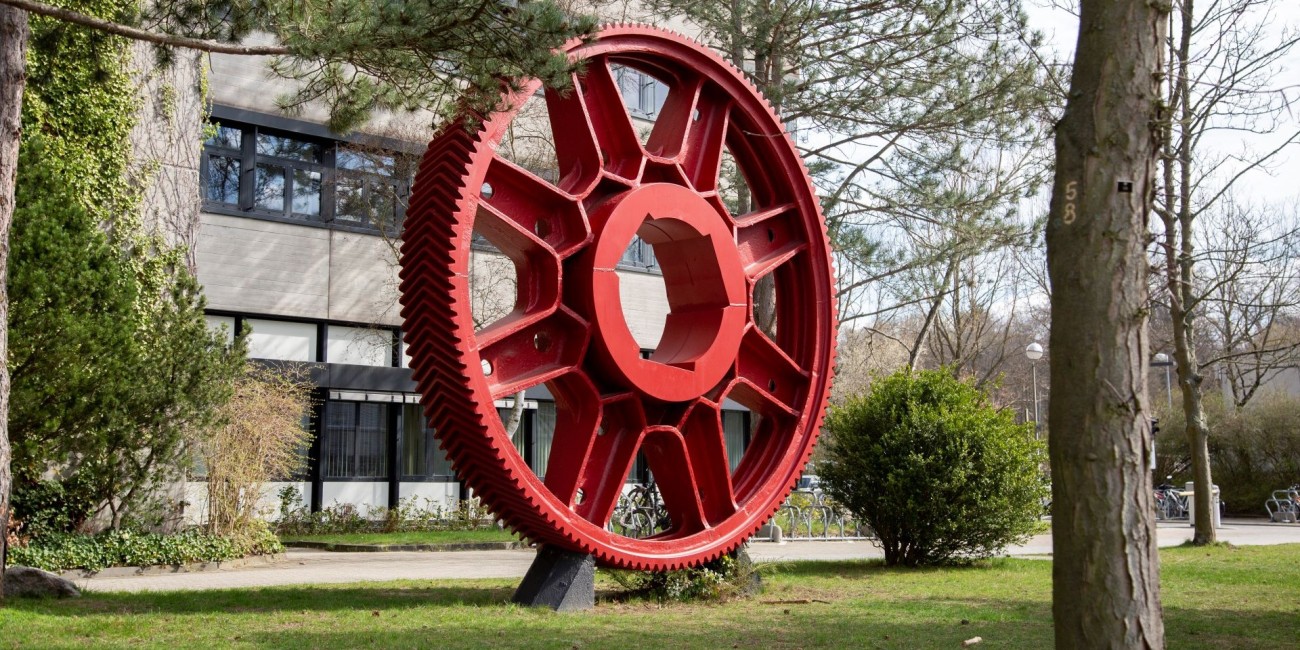Sebastian Haag M.Sc.
Contact
Sebastian Haag studied Mechanical and Process Engineering at the Technical University of Darmstadt and at the École polytechnique fédérale de Lausanne until 2013. In February 2014, Mr. Haag started working as a research associate at the Department of Computer Integrated Design at Technische Universität Darmstadt.
From February 2014 to September 2015, Mr. Haag worked at the department’s training center Information Processing in Mechanical Engineering (IiM) in the field of 3D-CAD training. The students of the Bachelor's degree program Mechanical and Process Engineering are trained here as part of the course Computer Aided Design in the handling of the CAD system Siemens NX and the PDM-System Teamcenter.
Since July 2014, he supervises the two-year student projects of the international funding program PACE – Partners for the Advancement of Collaborative Engineering Education – of the companies General Motors, Siemens PLM, Autodesk, Hewlett-Packard and Oracle. The initiative, launched in 1999, provides state-of-the-art CAD/CAM/CAE and PLM software to internationally strategically selected universities and supports them with the necessary hardware to strengthen the innovative, modern education of future engineers. In the current two-year project PUMA – Personal Urban Mobility Access – students of TU Darmstadt together with fellow students from Tongji University, Politecnico di Torino, Hunan University, Kookmin University and RWTH Aachen University are to design, develop, engineer, and manufacture a portable solution for individual mobility.
Digital Twin
The primary research focus of Mr. Haag is the subject Digital Twin, in particular the automated instantiation of digital twins based on the actual geometry of real components.
The Digital Twin is a digital representation of a physical object, in particular a component, an assembly or a product that actually exists (physical twin). The Digital Twin has a bidirectional data connection to its physical twin and allows a computer-internal visualization of its current state and behavior at each point in time.
Smart Components within Smart Production Processes and Environments
Since November 2016, Mr. Haag is working on the international project “Smart Components in Smart Production Processes and Environments (SCoPE)” in cooperation with two institutes of the Brazilian Universities Universidade Metodista de Piracicaba (UNIMEP) and Universidade de Sao Paulo (USP).
The project is part of the BRAGECRIM initiative (Brazilian German Collaborative Research Initiative in Manufacturing Technology), funded by the DFG, CAPES and FINEP, in which scientists from thirty university research institutes and Fraunhofer institutes in Brazil and Germany are conducting joint research on sustainable value creation in manufacturing. The initiative promotes the exchange and mobility of scientists from both countries.
The aim of the SCoPE project is the introduction of components as information carriers, which possess information about their physical properties, customer-specific adaptations, production history and purpose. Modern internet technologies are used to network components as information carriers and to access external sources of information, such as production databases and data management systems. These so called “smart components” will then be able to control their production and assembly processes and move autonomously through an intelligent factory equipped with cyber-physical production and logistics systems. Possible applications are the traceability of the manufacturing history of individual components, e.g. to investigate component failure, or to use component data to achieve optimal tolerance pairing in the mounting of complex assemblies.
Resource Efficiency through the Digital Transformation of Industry in SME
Mr. Haag was a collaborator in the project “Resource Efficiency through the Digital Transformation of Industry in SMEs” and co-author of the study (opens in new tab) with the same name. The study was carried out by the VDI Resource Efficiency Center, which worked on behalf of the Federal Ministry for the Environment, Nature Conservation, Building and Nuclear Safety, in cooperation with the Ministry of Environment, Climate and Energy Baden-Württemberg, the Bavarian State Ministry for the Environment and Consumer Protection, the Hessian Ministry Economic Affairs, Energy, Transport and Regional Development and the Ministry of the Environment, Energy, Food and Forestry Rhineland-Palatinate. The study was funded by the National Climate Initiative of the Federal Ministry for the Environment, Nature Conservation, Building and Nuclear Safety and the ministries involved.
The aim of the study was to provide evidence on the implications of digital transformation for resource efficiency in small and medium sized enterprises (SMEs). Essentially, digitization measures and applications and their contribution to increasing resource and energy efficiency were examined. The focus was on case studies of SMEs and research activities of the project consortium. This ensures both the presentation of fields of action and development potential for the industry, as well as the derivation of future research needs. The study thus aims at creating transparency in these areas and presents solutions in the field of digital transformation to reduce the resource requirements of small and medium-sized enterprises.
Industrie 4.0 in a global Context
Mr. Haag was a project collaborator in the project “Industry 4.0 in the Global Context: Strategies for Cooperation with International Partners” and co-author of the study (opens in new tab) with the same name. The study was funded by the Federal Ministry for Economic Affairs and Energy (Bundesministerium für Wirtschaft und Energie, BMWi) and supervised by the German Aerospace Center (Deutsches Zentrum für Luft- und Raumfahrt, DLR).
During the period from September 2015 to June 2016, over 150 interviews were conducted with experts from Germany, China, Japan, South Korea, the United Kingdom and the United States. The aim of the project was the efficient support of German companies and institutions in the formation of cooperations for the establishment of a lead provider in the context of Industry 4.0 and the associated preservation of added value and employment in Germany and in Europe through an overview study on international cooperation in the context of Industry 4.0. The study, which was developed during the project, provides empirically based statements on the opportunities and challenges of international cooperation between companies and institutions in the field of research and development as well as norms and standards.
CypIFlex
Mr. Haag was a project collaborator in the CypIFlex project, a research project approved by the Hessian Ministry of Economic Affairs, Energy, Transport and Rural Development (HMWEVL). The project was funded under the Operational Program for the Promotion of Regional Competitiveness and Employment in Hesse from the European Regional Development Fund (ERDF) and from state resources. It consisted of a consortium of various companies from the IT, automation and manufacturing sectors and the Department Computer Integrated Design of Technische Universität Darmstadt.
The aim of the CyplFlex project was to enable medium-sized mass production companies to develop specific Industry 4.0 solutions and successfully deploy them in order to generate quantifiable added value along the value chain. For this purpose, the developed procedural model was carried out exemplary in a prototype implementation in a real production and intralogistics environment. It was challenging to attain acceptance of the participating value-adding partners for the idea of linking production with information and communication technologies (Industrie 4.0).
- Development of a reference process for the integration of quality assurance data into digital twins (Advanced Research Project)
- Development of methods for marking and modification of geometry elements for the digital twin (Advanced Design Project)
- Development of a concept for specification and configuration of digital twins by means of STEP (Bachelor Thesis)
- Analysis and testing of commercial IoT platforms (Advanced Design Project)
- Investigation of applications of the digital twin (Advanced Research Project)
- Development of a Digital Twin Demonstrator (Bachelor Thesis)
- Development of a Digital Twin Demonstrator (Advanced Design Project)
- Development of a virtual parameter model for planning, design and simulation of an ergonomic test bench (Bachelor Thesis)
- Development and evaluation of a process model for the management of Cybertronic information in PDM systems (Bachelor thesis)
- Concept for the return of real product geometry data to the digital twin (Bachelor Thesis)
- Return of product usage data from intelligent networked products to product development (Bachelor Thesis)
- Examination of methods for the exchange of information between networked products and PLM systems (Master Thesis)
- Development of an interface to exchange parameters of a head-up display configurator and the CAD environment to support simultaneous engineering (Master Thesis)
- Development of a concept for smart component interactions in smart assemblies (Master Thesis)
- Development of a Component Data Model for Smart Assemblies in Industry 4.0 Scenarios (Advanced Design Project)
- Analysis and Testing of Big Data Technologies (Advanced Design Project)
- Personal Urban Mobility Access 2018 (Advanced Design Project)
- Personal Urban Mobility Access 2017 (Advanced Design Project)
- Reconfigurable Shared-Use Mobility Systems 2016(Advanced Design Project)
- Reconfigurable Shared-Use Mobility Systems 2015 (Advanced Design Project)
- Portable Assisted Mobility Device 2014 (Advanced Design Project)
- Global Collaborative Engineering 2016 (Advanced Design Project)
- Global Collaborative Engineering 2015 (Advanced Design Project)
- Global Collaborative Engineering 2014 (Advanced Design Project)

Error on loading data
An error has occured when loading publications data from TUbiblio. Please try again later.
-
; {{ creator.name.family }}, {{ creator.name.given }}{{ publication.title }}.
; {{ editor.name.family }}, {{ editor.name.given }} (eds.); ; {{ creator }} (Corporate Creator) ({{ publication.date.toString().substring(0,4) }}):
In: {{ publication.series }}, {{ publication.volume }}, In: {{ publication.book_title }}, In: {{ publication.publication }}, {{ publication.journal_volume}} ({{ publication.number }}), ppp. {{ publication.pagerange }}, {{ publication.place_of_pub }}, {{ publication.publisher }}, {{ publication.institution }}, {{ publication.event_title }}, {{ publication.event_location }}, {{ publication.event_dates }}, ISSN {{ publication.issn }}, e-ISSN {{ publication.eissn }}, ISBN {{ publication.isbn }}, DOI: {{ publication.doi.toString().replace('http://','').replace('https://','').replace('dx.doi.org/','').replace('doi.org/','').replace('doi.org','').replace("DOI: ", "").replace("doi:", "") }}, Official URL, {{ labels[publication.type]?labels[publication.type]:publication.type }}, {{ labels[publication.pub_sequence] }}, {{ labels[publication.doc_status] }} - […]


